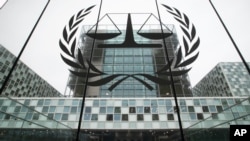The head prosecutor at the International Criminal Court said Monday he is seeking arrest warrants for Israeli Prime Minister Benjamin Netanyahu and Defense Minister Yoav Gallant, along with the Hamas leader in Gaza Yahya Sinwar and two other Hamas officials in connection with the Israel-Hamas war.
Karim Khan said in a statement that his office believes Netanyahu and Gallant “bear criminal responsibility” for war crimes and crimes against humanity, including starving civilians as a method of warfare and intentionally directing attacks against civilians.
“My office submits that these acts were committed as part of a common plan to use starvation as a method of war and other acts of violence against the Gazan civilian population as a means to eliminate Hamas, secure the return of the hostages which Hamas has abducted, and collectively punish the civilian population of Gaza, whom they perceived as a threat to Israel,” Khan said in a statement.
In addition to Sinwar, Khan said the commander of the Hamas military wing Mohammed Diab Ibrahim al-Masri and the head of the Hamas political bureau Ismail Haniyeh are also responsible for war crimes and crimes against humanity.
Khan said the accusations against the Hamas officials include murder, taking hostages as a war crime, rape and other sexual violence, and torture.
“It is the view of my office that these individuals planned and instigated the commission of crimes on 7 October 2023, and have through their own actions, including personal visits to hostages shortly after their kidnapping, acknowledged their responsibility for those crimes,” Khan said. “We submit that these crimes could not have been committed without their actions.”
US talks
Gallant said Monday that Israel is committed to broadening its ground operations in the southern Gaza city of Rafah, as he met with White House national security adviser Jake Sullivan.
Gallant said in a statement that he told Sullivan effort in Rafah was aimed at dismantling the Hamas militant group and securing the return of the hostages still being held in Gaza.
Gallant also said he and Sullivan discussed ways to strengthen Israel’s position in the Middle East.
Sullivan met Sunday with Israeli Prime Minister Benjamin Netanyahu to discuss a more targeted Israeli military operation against Hamas in Gaza that would lower risks of civilian collateral damage.
The U.S. official reiterated President Joe Biden’s “longstanding position on Rafah,” the White House said, referring to calls by Biden to avoid a major offensive in Rafah due to fears of a humanitarian disaster.
Sullivan also briefed Netanyahu on his discussions with Saudi Crown Prince Mohammed bin Salman in Saudi Arabia, the White House said. A U.S. plan would have Saudi Arabia recognize Israel and help the Palestinian Authority govern Gaza in exchange for a path to eventual statehood for the enclave.
Israel pummels Gaza; White House envoy in Israel for cease-fire talks
"Mr. Sullivan reaffirmed the need for Israel to connect its military operations to a political strategy that can ensure the lasting defeat of Hamas, the release of all the hostages and a better future for Gaza," the White House said.
Netanyahu's office said in a statement the meeting focused on Israel's military operation in Rafah, humanitarian aid and hostages held in Gaza.
Netanyahu opposes the idea of an independent Palestine as an existential threat to Israel's national security.
He says Israel will keep open-ended security control over Gaza and will only work with local Palestinians unaffiliated with Hamas or the Western-backed Palestinian Authority.
Netanyahu has vowed not to let up the fight against Hamas until the Islamist group is defeated and all remaining hostages are brought home.
However, his Cabinet is facing an internal rift on a postwar Gaza governance plan.
Benny Gantz, one of the ministers of his War Cabinet, threatened to quit the governing coalition Saturday, unless Netanyahu approves a postwar "action plan" by June 8.
Gantz said this must include steps to defeat Hamas, to bring home the hostages and take steps toward the formation of an "American, European, Arab and Palestinian administration that will manage civilian affairs in the Gaza Strip."
Netanyahu called Gantz's comments "washed-up words" and said they would lead to "a defeat for Israel, the abandoning of most of the hostages, leaving Hamas intact and the establishment of a Palestinian state.”
Fighting across Gaza
Fierce fighting is raging across the Gaza Strip, as Israel attempts to defeat re-emerging Hamas cells.
The Israeli military said Monday it had conducted airstrikes against about 80 targets during the past day, including ammunition depots and Hamas infrastructure sites.
Israel also reported ground fighting and airstrikes in eastern Rafah, as well as fighting in the Jabaliya area in northern Gaza.
Humanitarian crisis
Battles near the Rafah and Kerem Shalom crossings in Gaza's south have also "effectively blocked" the humanitarian aid routes there, Martin Griffiths, the U.N.'s undersecretary-general for humanitarian affairs and emergency relief coordinator, said Sunday.
"So, aid getting in through land routes to the south and for Rafah, and the people dislodged by Rafah is almost nil," Griffiths said, calling the humanitarian crisis near “apocalyptic.”
He said, if aid does not reach the people who need it, “that famine, which we have talked about for so long, and which is looming, will not be looming anymore. It will be a present."
Israel's war on Gaza was triggered by the October Hamas terror attack on Israel that killed 1,200 people and led to the capture of about 250 hostages, according to Israeli officials.
Israel’s subsequent counteroffensive in Gaza has killed more than 35,400 Palestinians, according to the Hamas-run Gaza Health Ministry, which includes civilians and combatants in its count, but says most of the dead are women and children.
Israel says it has killed more than 14,000 militants and around 16,000 civilians.
Some information for this report was provided by Reuters, The Associated Press and Agence France-Presse.





Forum